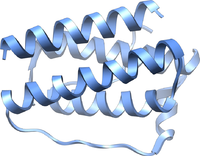
Photo from wikipedia
Pregnancy is a time of increased food intake and fat deposition in the mother, and adaptations of glucose homeostasis to meet the energy demands of growing fetus. As part of… Click to show full abstract
Pregnancy is a time of increased food intake and fat deposition in the mother, and adaptations of glucose homeostasis to meet the energy demands of growing fetus. As part of these adaptations, leptin and insulin concentrations increase in the maternal circulation during pregnancy. Central effects of leptin and insulin, however, are counterproductive to pregnancy, as increased action of these hormones in the brain lead to suppression of food intake. To prevent this, it is well documented that pregnancy induces a state of leptin- and insulin-insensitivity in the brain, particularly the hypothalamus, in a range of species. While the mechanisms underlying leptin- or insulin-insensitivity during pregnancy vary between species, there is evidence of reduced transport into the brain, impaired activation of intracellular signalling pathways, including reduced leptin receptor expression, and attenuated activation of downstream neuronal pathways, especially for leptin insensitivity. Pregnancy-induced changes in prolactin, growth hormone and leptin are discussed in terms of their role in mediating this reduced response to leptin and insulin.
Journal Title: Molecular and Cellular Endocrinology
Year Published: 2020
Link to full text (if available)
Share on Social Media: Sign Up to like & get
recommendations!